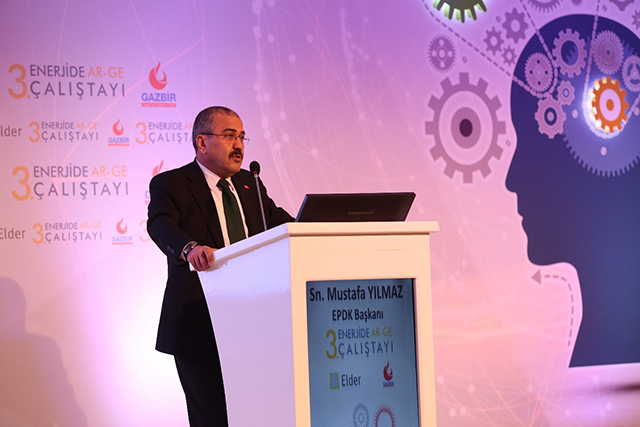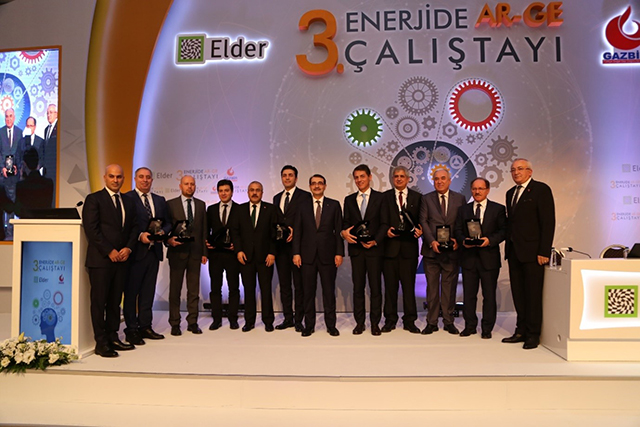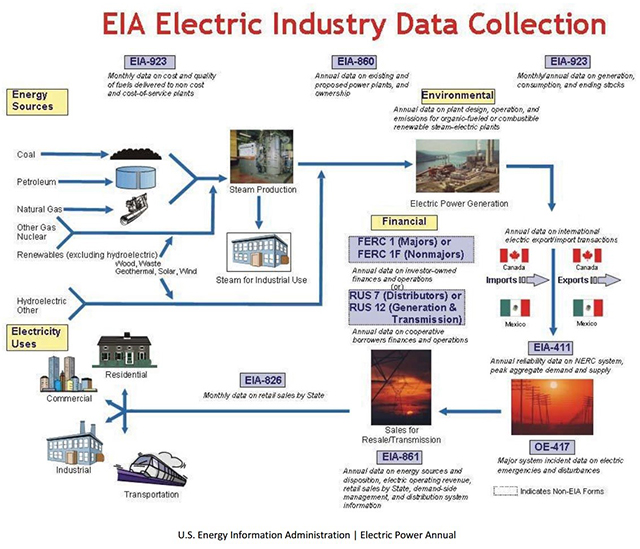
The third annual ‘R&D in Energy Workshop’ organized jointly by the Association of Electricity Distribution System Operators (ELDER) and the Natural Gas Distribution Companies Association (GAZBİR) under the coordination of Energy Market Regulatory Authority (EMRA) was held on Tuesday, December 19th in Ankara. Gathering universities,technocities, utilities and authorities together with electricity and natural gas distribution companies, this year’s event has presented the first R&D Achievement Awards to winners.
During “the 3rd R&D in Energy Workshop”, coordinated by the Energy Market Regulatory Authority (EMRA) and hosted by Serhat Çeçen ,Chairman of the Board of Association of Electricity Distribution System Operators (ELDER), and by Yaşar Arslan, Chairman of the Board of Natural Gas Distribution Companies Association (GAZBİR), the roles to be assumed by electricity and natural gas distribution companies in the new market were discussed along with R&D priorities. The workshop included various panels and B2B talks that allowed academics and nearly 400 professionals representing the sector to exchange information about R&D efforts in energy sector.
At the opening session of this year’s event where the first R&D Achievement Awards were presented to the winners, the opening remarks were made by Republic of Turkey Ministry of Energy and Natural Resources Undersecretary Fatih Dönmez, EMRA President Mustafa Yılmaz, Association of Electricity Distribution System Operators (ELDER) Chairman Serhat Çeçen and Natural Gas Distribution Companies Association (GAZBİR) Chairman Yaşar Arslan.
Fatih Dönmez, Republic of Turkey Ministry of Energy and Natural Resources Undersecretary: “We attach great importance to R&D in domestic energy as required by Turkey’s National Energy and Mining Strategy”

During his opening speech, Fatih Dönmez, Republic of Turkey Ministry of Energy and Natural Resources Undersecretary, pointed out the following: “In our national energy and mining strategy, the essential component of the Renewable Energy Resource Area (YEKA) tender model is domestic energy, and the new domestic R&D projects. Thanks to the incentives of the government in recent years, we have seen a dramatic improvement in R&D. In 2000s, and even before 2000, the money allocated to R&D accounted for 4 in 10 thousand of the total Gross Domestic Product. The target was to reach 1% for many years, and we almost achieved only a year ago. However, we should exert greater efforts to get close to the level of 1% in the sector. Although we said that the budget to be allocated for R&D by the electricity and natural gas distribution companies is 1% of their operational expenditure budgets, these are globally determined on the basis of the total GDP.” Highlighting the importance of collaboration with universities for R&D, Dönmez also stated the following: ''We have witnessed that R&D efforts carried out by universities focus mostly on solar and wind energy. The third area studied by most of the universities is energy efficiency, which is followed by batteries and electric vehicles. In our survey, we have seen 244 million TL worth of R&D expenditure. Although it is not possible to segregate the expenditures made by each university, it was observed that solar energy received the highest amount of R&D expenditures, which is over 80 million TL. R&D expenditures costed nearly 40 million TL in wind energy, and nearly 30 million TL in battery technologies (including electric vehicles), according to our survey.”

Addressing at the workshop, EMRA President Mustafa Yılmaz stated the following: “The natural gas and electricity consumption increases as Turkey grows. I believe that we are capable of achieving more sophisticated electricity and natural gas networks, by which I mean networks that are improving while also growing into an efficient system, in parallel with the growth in our country. As EMRA, we have allocated R&D budgets for electricity and natural gas distribution companies to attain the level of international quality standards in the infrastructure of our electricity and natural gas distribution system, increase the amount of domestic energy, and decrease losses and costs. Considering the R&D applications that have been approved by EMRA’s R&D Commission and the projects that have been completed since 2004, I assure that we have come a long way. Our Authority has approved 137 of the 369 projects submitted by the electricity and natural gas distribution companies, and 32 of these approved projects were finalized. The approximate cost of all the projects approved by our Authority since 2014 reached 111 million Turkish liras.”

Chairman of the Board of ELDER, Serhat Çeçen: ''As the electricity distribution sector, we are attaching great importance to R&D in order to maintain the continuous satisfaction of our customers and benefit from the opportunities of technology to the fullest. In the current tariff period, we have allocated 203 Million TL of the 20 Billion TL -worth technology investment.''
Çeçen who mentioned that as ELDER they are carrying out two projects that received an EU grant within the framework of Horizon 2020 added the following: ''With the SmarterEMC2 project to be completed at the end of the year, we will both be integrating the renewables to the existing electricity network by using technology, and we will be enabling the consumers to follow up their electricity consumption and thus encouraging them to save energy through a mobile application via the PeakAPP project to be completed in 2019. Through PeakAPP, our users will be able to see their electricity consumption levels on their smart phones, compare their consumption with that of other consumers and they will also be able to see their consumption opportunities. On the other hand, through the energy saving game of the application which motivates the consumers through instantaneous personalized tips for energy efficiency and suggestions, consumers will learn and have fun at the same time. As ELDER, to be able to boost the service quality and customer satisfaction in the sector, we will continue to generate synergy between the companies and to enhance the social, national and economic benefits that we have been offering to our society and country as we did to this date.”

Yaşar Arslan, Natural Gas Distribution Companies Association (GAZBİR) Chairman, expressed the investments and the R&D efforts in the natural gas distribution sector during his opening speech. Discussing the investments in his sector, Arslan said, “The investments that have been made in the natural gas distribution sector so far are worth 27 billion TL in total. In the 5-year period between 2017-2021, we are going to make an investment of nearly 6 billion TL. Our sector is growing 8 % each year in terms of network length. Thanks to these investments, 222 new districts will have natural gas. The number of our natural gas subscribers reached 13,2 million as of the end of 2017. The distribution networks reached 55 Million citizens. 45 Million citizens are benefiting from the comfort of natural gas.'' Arslan continued his remarks as follows: ''Since 2014, 369 R&D projects were submitted to EMRA by the electricity and natural gas companies and 137 of them were approved. 19 of them were prepared by the natural gas distribution companies and 188 by electricity distribution companies. In the last 3 years the budgets of the R&D projects carried out in order to increase service quality and improve the technologies used in the electricity and natural gas sectors reached 111,3 Million TL. The amount of budget allocated to the approved projects in the natural gas sector is worth around 8 Million 590 thousand TL. As the whole sector we have an annual R&D budget of approximately 12 Million TL for 2018. The innovation investments must also be considered in the R&D budgets.”
Arslan continued as follows, “Turkey aims for a 15% reduction in its primary energy consumption by 2023. As part of the project, we are working to save energy equal to nearly 3700 MW of installed power, as well as to improve the existing buildings. The economic value of this energy saving is equal to 4 billion USD. As of 2017, there are 9.1 million buildings in Turkey. 87% of these buildings are residential buildings. The number of residences is over 22 million. 5.6 million of these residences were found to be suitable for insulation work as part of the project. We are planning to collaborate with the Renewable Energy General Directorate to offer low interest loans for insulation works to be carried out by the distribution companies. This plan covers 1.7 million residences for each year between 2018-2023. The insulation plan will allow us to save 3.7 billion cubic meters of natural gas between 2018-2023.”

Best R&D Projects in Electricity and Natural Gas Distribution Sectors Awarded
This year’s workshop has brought in something new. R&D projects developed in the electricity and natural gas distribution sectors were evaluated by EMRA and awarded accordingly. In the Category of Network Operating, the award-winning companies were Boğaziçi Electricity Distribution Inc. in electricity distribution sector, and Kayserigaz in natural gas distribution sector. In the Categories of Reducing Technical and Non-Technical Losses and Business Processes, Vangölü Electricity Distribution Inc., Dicle Electricity Distribution Inc., Aras Electricity Distribution Inc. and Akdeniz Electricity Distribution Inc. were awarded in the electricity distribution sector. Sakarya Electricity Distribution Inc. won the award in the Category of Communication Technologies while the winner of the Category of Tracking and Control was Enerya Natural Gas Distribution Companies.
During the workshop held after the opening remarks and the award ceremony, the electricity and natural gas distribution companies were informed about the R&D projects developed by the other players in the sector and potential university and industry opportunities were evaluated in the area of R&D during the bilateral meetings held within the scope of the workshop. During the last session of the workshop awareness was raised in the sector in general through the presentations made by professionals specialized in the area of Cyber Security, one of the most critical issues of today's world.










